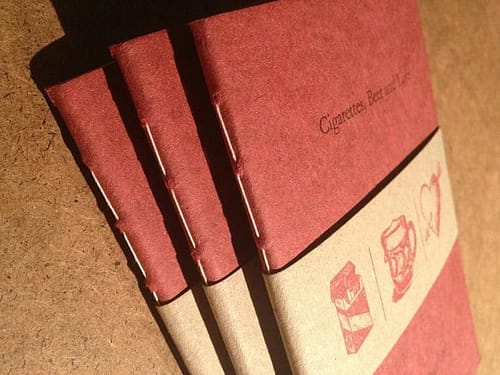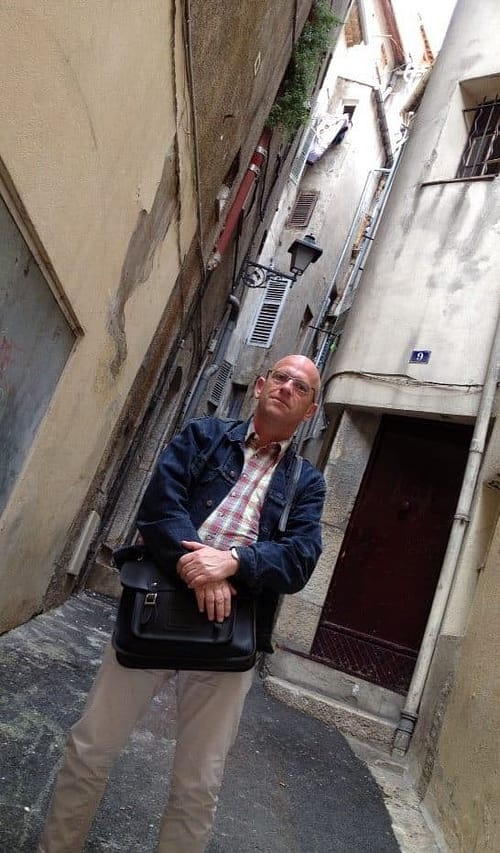Cigarettes, Beer and Love a hand made volume of poems by Ralph Dartford, Reviewed by Caleb Parkin
When I saw Ralph perform at Words on Tap a few months ago, he was big on promoting this collection’s hand-craftedness. So let’s start with that: The Book As Thing. It’s a really pleasing Thing, if a petite one; twenty poems, interspersed with images (mostly photos, but for a line-drawing of a robot, shaking hands with a man in a suit, (which I would like on a t-shirt, having a penchant for robot-motif t-shirts)).
Hats off on that front; I really enjoyed the images alongside the poems. Indeed, I’d say there’s extra ‘poetry’ – more dissonances and resonances – between the photos and the poems themselves. And why shouldn’t there be ‘poetry’ between words and objects, poems and pictures? It’s already there, if we let it be.
Ralph seems keen on the edges of things, on signs and notices, and – sometimes – on images which don’t have an outright or obvious link to the words – and all for the better. The first piece, Jimmy – a remembrance of a childhood ‘camp’ or den – is placed next to a ‘Keep Britain Tidy’ logo. Maybe the stylised figure on it (a little Ralph?) is throwing away that ‘picture/of a nude person’ the poem mentions, which became ‘discoloured/with the autumn of our friendship’; I enjoyed the possibilities this offered. (Actually, I nearly missed the ‘secret book’ poem ‘Lithium Rose’, which folds out from a pixelated/grainy series of pictures of the tops of bare trees, right in the middle of the collection. But this was another nice use of the Book As Thing with images offering a visual, tactile element to the work.)
The dedication at the front reads, ‘For John Hegley/who told me to do one’ – whether that means to piss off, or to ‘do’ a poetry collection, is left open (I’d imagine the latter, or maybe both – is there a story there?). The second poem – The Palindrome – certainly has a Hegley quality to it – fun to hear read aloud – with its peppering of palindromes, quick rhyme and short lines: it’s a nice pacey piece and sets the bawdy tone for some of the others (a tone the collection’s title elicits too). For me, Disco with its detailed account of the ‘bee’s knees of Basildon,/the peroxide princess’ and the battle for her affections begged to be spoken, with all its detailed lairy-ness.
Oxford Blue has that singsong Hegley quality, too, and begs to be read aloud – perhaps with a tune:
I’m not saying that I’m jealous.
I’m not saying that I’m hurt.
I never really cared for her,
But I loved that Oxford Blue shirt.
Ralph’s good at gaging the pleasure that readers can get from a good rhyme and the anticipation of it. What I liked over the whole collection was the plain-speaking quality, which makes for surprising moments in its use of language and line-breaks. It isn’t full of obscure references and allusions, but instead reconfigures very everyday things with very everyday words – but not in an everyday way.
I guess a really good example of that is the Co-op Live Art Fiasco (Ralph is also an Arts Council Officer and this – hopefully imagined – incident describes a version of some of the stuff he – and the National Lottery the shoppers are queuing for – funds), where Lucozade is, err, repurposed in a way that leads to the police being called. The punchline – which some of the poems do deftly and others deliberately eschew – about the police response to his ‘Live Art’ moment is pleasing. And as someone who knows a fair few performance artists – and has seen a fair amount of performance art – it certainly rings (ahem) true.
There’s a lot of portraiture in the book – of Ralph himself and of other figures – real, imaginary or some mixture of both, I would think. (I guess all poetry about the self is real and imaginary, both and neither…). The Dandy is both tragic and trippy, with the characters sad, lewd backstory of an acrobat lover who ‘vanished/ on bareback/with Horseshoe Shane/ a man who could/ make her stand/ on her head/ after hours’ leading to a really affecting description of his demise, his ‘blankets of Tuesday’s Telegraph/ blown away’. The short lines work really well for me here and in other poems; the constant shifting and ricocheting of meaning as you work your way through. For me, that’s what can be really exciting about reading a poem – the twist and turn of just a few well-chosen words.
I also really enjoyed The Ukelele Lady for its warm, weary renderings of – in this case elderly – people: “the smell of stewed fruit,/ the dribbling mouths,/ and TV quizzes/ always smothers”. A punchline of a different kind here – and I had a little welling-up moment at its conclusion, where one is reminded of the dispassion that can develop between the elderly and those who care – or purport to care – for them.
There’s a good balance in Cigarettes, Beer and Love: of cruelty and kindness between people; of the different kinds of relationship in which these play out; of out-there absurdity mixed with the tangible stuff of life; of humour and pathos, sometimes from one line to the next, as well as between poems, and pictures.
Let’s finish with a poem about starting and finishing, about living and dying. Ralph’s mother – in the piece The Thing She Said – tries to rally him, during her last days, by saying, ‘Go live your life,/ try to do everything. Don’t stop!’ – and, concluding the poem, he writes, ‘It’s two years on now. Where do I start?’
It’s this deft poise between the upbeat, jovial, and life-affirming alongside the futile, brutal and tragic which makes this book work for me. And with the verve and amiability which that The Thing She Said seems to aspire to. Not stopping – despite the pain, despite the gory details.
And in a jolly nicely-made little book and all.
You can buy Cigarettes, Beer and Love from the Ossett Observer Shop on Etsy.

